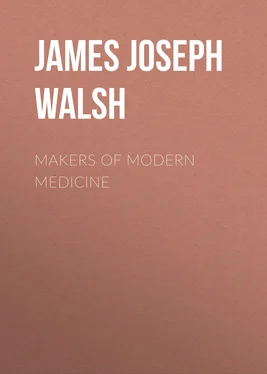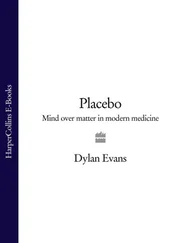James Walsh - Makers of Modern Medicine
Здесь есть возможность читать онлайн «James Walsh - Makers of Modern Medicine» — ознакомительный отрывок электронной книги совершенно бесплатно, а после прочтения отрывка купить полную версию. В некоторых случаях можно слушать аудио, скачать через торрент в формате fb2 и присутствует краткое содержание. Жанр: foreign_prose, Медицина, foreign_antique, на английском языке. Описание произведения, (предисловие) а так же отзывы посетителей доступны на портале библиотеки ЛибКат.
- Название:Makers of Modern Medicine
- Автор:
- Жанр:
- Год:неизвестен
- ISBN:нет данных
- Рейтинг книги:3 / 5. Голосов: 1
-
Избранное:Добавить в избранное
- Отзывы:
-
Ваша оценка:
- 60
- 1
- 2
- 3
- 4
- 5
Makers of Modern Medicine: краткое содержание, описание и аннотация
Предлагаем к чтению аннотацию, описание, краткое содержание или предисловие (зависит от того, что написал сам автор книги «Makers of Modern Medicine»). Если вы не нашли необходимую информацию о книге — напишите в комментариях, мы постараемся отыскать её.
Makers of Modern Medicine — читать онлайн ознакомительный отрывок
Ниже представлен текст книги, разбитый по страницам. Система сохранения места последней прочитанной страницы, позволяет с удобством читать онлайн бесплатно книгу «Makers of Modern Medicine», без необходимости каждый раз заново искать на чём Вы остановились. Поставьте закладку, и сможете в любой момент перейти на страницу, на которой закончили чтение.
Интервал:
Закладка:
Other medical writers of the time perhaps, as the result of reading Professor Vogel's book, made the same mistake in their appreciation of Auenbrugger's work. Vogel himself insisted that Auenbrugger did wrong to claim any originality for his invention, since it had been used so long before by Hippocrates. He adds that what is original with Auenbrugger is of very little value, the older ideas being the only ones worth while considering with regard to the application of this so-called new method of diagnosis. Vogel was an authority in medicine at the time and other commentators took the key note from him in this matter, and in many parts of Germany it was generally accepted that Auenbrugger's method of percussion was only an elaborated method of the so-called succussion of Hippocrates.
Under these circumstances it is perhaps not surprising that Auenbrugger's work attracted very little attention in the German-speaking countries. In Vienna itself, as we have already said, Van Swieten and De Haen failed utterly to recognize its value. Outside of Vienna their example was naturally followed, for the Vienna school was considered authoritative, and surely, if any one, the professors of the University of Vienna might be expected to know whether Auenbrugger's new discovery was really of any value or not.
It is interesting to compare Auenbrugger's state of mind, with regard to the neglect of his discovery, with Laennec's remark in the preface of his book. Laennec said: "For our generation is not inquisitive as to what is being accomplished by its own sons. Claims of new discoveries made by contemporaries are apt for the most part to be met by smiles and mocking remarks. It is always easier to condemn than to test by actual experience." Auenbrugger seems to have suffered from more than the neglect of which Laennec complains. When he speaks of envy and calumny in no uncertain terms, the only conclusion possible is that his representations as to his discoveries must have been set down as pretensions that his contemporaries considered unjustified by what they knew of his work.
It is interesting also to note that both men found their prospects of reward, not in the good will of their contemporaries, nor even the prospect of fame, but in the hope that their work would be useful in lessening the sum of human suffering. Laennec said: "It suffices for me if I can only feel sure that this method will commend itself to a few worthy and learned men who will make it of use to many patients. I shall consider it ample, yea more than sufficient reward for my labor, if it should prove the means by which a single human being is snatched from untimely death."
Laennec's words are almost an echo fifty years afterward of Auenbrugger's expressions, just quoted: "I console myself," he said, "with the thought that I have accomplished a work which will earn the gratitude of all true devotees of the art of medicine, since I have succeeded in making clear many things which shed not a little light on the chapter of the obscure diseases of the chest, in which our knowledge has hitherto been so very incomplete."
As a rule it may be said that medical observers whose genius leads them to step across the narrow line that separates the known from the unknown are likely to lack the appreciation of their own generation. Long before Auenbrugger or Laennec, Harvey, the discoverer of the circulation of the blood, said to friends that he did not expect any one of his generation to accept the new doctrine, and it is well known that the great medical men of the time did not accept it. Harvey is not an isolated example, and even in our own time real medical progress sometimes waits for years for recognition, while well-advertised pretended advances are occupying the centre of the stage. Auenbrugger's discovery made its impress, however, and was never entirely lost to sight. Even before his death there was the consoling prospect of its meeting with adequate attention.
De Haen's successor in Vienna, Maximilian Stoll, treated Auenbrugger's work very differently from his predecessors, and was the first to introduce it practically into clinical medical training. Stoll did not hesitate in his clinic, on the strength of what was discovered by means of percussion, to attempt the evacuation of fluid from the pleural cavity on a number of occasions. It can be easily understood that with their lack of knowledge of the necessity for thorough cleanliness in the surgical sense, such an operation might readily be followed by discouragingly fatal results. This actually happened in Stoll's own experience. He does not, however, seem to have abandoned his practice of tapping the chest because of this. He insisted to his students that Auenbrugger more than anyone else had experience in removing fluid, and especially purulent collections, from the chest, and he recommended the practice to them. He added that medicine owed as much to Auenbrugger for his rational method of treating effusions into the pleural cavity, whether of pus or serum, as for his diagnostic sign by which the presence of the fluid could surely be recognized.
Some of Stoll's pupils took up the work of commending Auenbrugger's method, and a little book written by one of them, Eyerel, came into the hands of the distinguished French physician, Corvisart. Eyerel did not hesitate to say, in his treatise on empyema, that the practice of percussion of the thorax, a diagnostic method introduced by the very distinguished Vienna physician, Auenbrugger, had been of great help to them in the study of this disease.
Once the great French professor of medicine, Corvisart, took it up, the new method of diagnosis was destined to have an immediate and world-wide vogue. Corvisart was not only a power in medicine because of his faculty of observation and his thorough appreciation of the work of others, but he was the court physician of the first Napoleon, and this gave any ideas that he favored many adventitious chances for publicity. Napoleon's well-known faculty for selecting men for special positions whose genius was calculated to be of service to him was never less at fault than when he violated most of the court medical traditions in Paris and chose Corvisart for the imperial physician. Corvisart's selection was the result of Napoleon's appreciation of his new method of diagnosis, namely, that of percussion, in chest diseases.
The Emperor himself was suffering from a persistent cold and was told that Corvisart, instead of following the traditional method of feeling the pulse, looking very wisely at the tongue and then gazing learnedly into space, conducted an actual examination of the chest and sounded it carefully all over, in order to determine where abnormal conditions might exist. This struck Napoleon as a very practical and possibly valuable feature of diagnosis. Accordingly Corvisart was summoned to give his professional opinion. After the consultation he was made the Emperor's private physician. When Corvisart took up the subject of percussion of the chest, it was practically unknown in Europe outside of Vienna. Even in the city of its origin, as we have seen, it was not well appreciated. Auenbrugger's little book had fallen into oblivion. Corvisart obtained his hint as to the possible value of percussion from Stoll's and Eyerel's appreciative remarks with regard to it. The Frenchman used the method to some extent and, realizing its value, resolved to call the attention of his countrymen and the medical world to this very helpful aid in diagnosis. It was at this time that he came upon Auenbrugger's original monograph. Instead then of writing himself on the subject, he translated Auenbrugger's little book into French and made a commentary on it.
Corvisart was Laennec's patron in medicine, his favorite teacher, and the man to whom the great French physician owed much of his early inspiration. It is no little merit in Corvisart's career thus to have been the connecting link between the men who did most for the practical science of medicine, and especially for the important but obscure chapter of diseases of the chest. He did not attempt at all to claim for himself any of the merit that he felt should rightfully go to Auenbrugger, and while his own observations and writings established percussion upon a firm basis and extended its knowledge, he shares the immortality of his discoverer, and comes down to us in medical history as an example of the reward of having rendered faithfully what was due, where it was due. It has been the custom to praise Corvisart for his justice toward Auenbrugger. Mere justice seems scarcely a worthy reason for praise of a great man, yet the history of medicine is so full of failures on the part of subsequent observers to acknowledge priority of discovery, that perhaps the praise does not seem quite as futile as it otherwise would.
Читать дальшеИнтервал:
Закладка:
Похожие книги на «Makers of Modern Medicine»
Представляем Вашему вниманию похожие книги на «Makers of Modern Medicine» списком для выбора. Мы отобрали схожую по названию и смыслу литературу в надежде предоставить читателям больше вариантов отыскать новые, интересные, ещё непрочитанные произведения.
Обсуждение, отзывы о книге «Makers of Modern Medicine» и просто собственные мнения читателей. Оставьте ваши комментарии, напишите, что Вы думаете о произведении, его смысле или главных героях. Укажите что конкретно понравилось, а что нет, и почему Вы так считаете.












